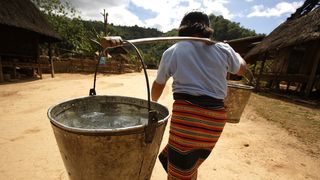In a recent address to the Australian National University's National Security College, Foreign Minister Marise Payne reflected that "COVID-19 is a shared crisis - a reminder that many problems are best solved or, indeed, can only be solved through co-operation." The upcoming round of the Australia-United States Ministerial Consultations (AUSMIN) presents a key opportunity to demonstrate this resolve in our immediate region.
While the Pacific Islands have so far been successful in containing coronavirus infection rates, the Griffith Asia Institute cautions that preparing for future outbreaks and offsetting the pandemic's economic impact on local communities and business will be an ongoing challenge. With health systems in the region already under strain before the pandemic, the long-term capacity of local governments to deliver on these objectives and meet broader development needs is uncertain.
While the Pacific Islands have so far been successful in containing coronavirus infection rates, the Griffith Asia Institute cautions that preparing for future outbreaks and offsetting the pandemic's economic impact on local communities and business will be an ongoing challenge.
Working with Pacific Island countries to sustainably meet the inter-related challenges of the pandemic should be a humanitarian and strategic priority for the Australia-United States alliance. Importantly, both countries have existing tools that can be employed to make rapid progress towards this goal.
The Australian Infrastructure Financing Facility for the Pacific (AIFFP) is a $2 billion initiative that offers grant and loan financing for public and private projects, with a focus on high-quality infrastructure that is responsive to the needs of partner governments and maximises local participation.
Similarly, the US International Development Finance Corporation (DFC) - a product of the BUILD Act of 2018 - was created to increase the effectiveness of America's existing development financing capabilities. It holds a mandate to channel private investment into projects which deliver development outcomes and further US foreign policy objectives, with a stated focus on the Indo-Pacific.
A partnership between these two institutions to deliver health-related infrastructure in the Pacific would enable deeper bilateral engagement while fostering long-term resilience against future infectious disease outbreaks.
It is in Australia's interests to lead the way.
In contrast to the broad geographic remit of American development and foreign assistance programs, the AIFFP and Department of Foreign Affairs and Trade's new Partnerships for Recovery strategy is solely focused on Australia's immediate region, pivoting our development program to near neighbours in the Pacific, Timor-Leste and Indonesia.
US and Australian projects can and should contribute to previous AUSMIN commitments to further the Global Health Security Agenda - a multilateral effort to strengthen global capacity to prevent, detect and respond to infectious disease threats.
Conversely, the DFC holds larger active investments in Africa and Latin America than in the Indo-Pacific, and, due to immediate needs and a proliferation of US government partners already working in-country on health projects, its new $US2 billion Health and Prosperity Initiative will prioritise health resilience-building in Africa in the wake of COVID-19.
Bilateral co-operation is an avenue to achieve sustained American engagement in the region through strategic investment of joint resources which can leverage Australia's institutional relationships in the Pacific. The DFC can play a role by supplementing the relative inexperience of the AIFFP with guidance based on its decades-long provision of development finance through its predecessor agency.
US and Australian projects can and should contribute to previous AUSMIN commitments to further the Global Health Security Agenda - a multilateral effort to strengthen global capacity to prevent, detect and respond to infectious disease threats. Partnering to deliver improved water, sanitation and hygiene (WASH) infrastructure in the Indo-Pacific is a clear candidate for such collaboration: there has already been a global call to prioritise WASH in preventing the spread of COVID-19 and building resilience against future infectious diseases.
An additional US $130 million is required each year over the next decade to support Papua New Guinea's water and sanitation infrastructure alone, with an estimated $US800 million financing shortfall for the country's broader health infrastructure. The Pacific Islands have the lowest rate of water coverage and the second-lowest level of sanitation coverage globally. Access to WASH infrastructure throughout the region is highly uneven between rural and urban areas; with major shortfalls in Kiribati, the Solomon Islands and Vanuatu, which collectively host 81 per cent of the region's population living without improved access to sanitation.
US and Australian co-ordination in this arena would ensure that both countries' infrastructure-financing programs elevate smaller, local projects, in addition to hard infrastructure such as ports and roads which are often viewed throughout the broader region as a proxy for great power competition. Crucially, such projects would also advance pledges by the two allies to prioritise gender equality and social inclusion in development outcomes. Already, women and girls have been disproportionately impacted by the current pandemic and experience reduced access to WASH in general.
How Pacific Island countries - and our Indo-Pacific region more broadly - emerge from the COVID-19 pandemic will have lasting strategic and economic implications for Australia and the United States, and it is in our shared national interests to support a sustainable and resilient regional recovery. Ensuring that any joint efforts are devised in consultation and with direct input from partner governments will be essential for achieving this goal.






